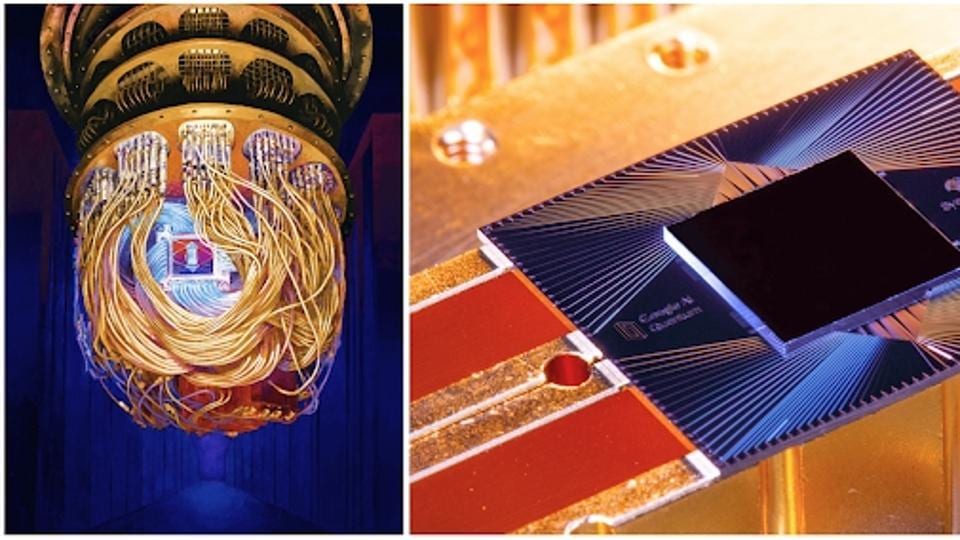Google claims ‘Quantum Supremacy’ with Sycamore chip that out-computes modern supercomputers
Google says its quantum computing chip completed a computation in 200 seconds which the world’s fastest supercomputer would have taken 10,000 years to deliver a similar output.

Google has developed a quantum computing chip that can easily outpace the modern supercomputers. Describing the feat as "Quantum Supremacy", Google says its new chip performed a target computation in 200 seconds which the world's fastest super computer would have taken 10,000 years to produce a similar output. Google CEO Sundar Pichai described the new chip as a "big breakthrough."
Google's 'Quantum Supremacy' was first reported by Financial Times last month. The company on Wednesday published its official study in Nature along with a detailed blog post. Google disclosed that it had developed a new 54-qubit processor, known as "Sycamore."
"The quantum supremacy experiment was run on a fully programmable 54-qubit processor named "Sycamore." It's comprised of a two-dimensional grid where each qubit is connected to four other qubits. As a consequence, the chip has enough connectivity that the qubit states quickly interact throughout the entire processor, making the overall state impossible to emulate efficiently with a classical computer," John Martinis, Chief Scientist Quantum Hardware and Sergio Boixo, Chief Scientist Quantum Computing Theory, Google AI Quantum explained in a blog post.
"The success of the quantum supremacy experiment was due to our improved two-qubit gates with enhanced parallelism that reliably achieve record performance, even when operating many gates simultaneously. We achieved this performance using a new type of control knob that is able to turn off interactions between neighboring qubits. This greatly reduces the errors in such a multi-connected qubit system. We made further performance gains by optimizing the chip design to lower crosstalk, and by developing new control calibrations that avoid qubit defects," they added.
Very proud that our @GoogleAI team has achieved a big breakthrough in quantum computing known as quantum supremacy after over a decade of work, as published in @Nature. Thank you to our collaborators in the research community who helped make this possible.https://t.co/yZUUbZsyA0
— Sundar Pichai (@sundarpichai) October 23, 2019
After having achieved quantum supremacy, Google researchers are now looking at its applications which range from machine learning, quantum chemistry to quantum physics. Going forward, the team will make its quantum processors available to more researchers and firms interested in developing relevant algorithms. You can read the full Google quantum computing study here.
Google's latest feat is going to revive interest in the quantum computing field. Already, technology companies such as Microsoft and IBM are working towards building quantum computers.
IBM has already showcased its early versions of a functional quantum computer. Microsoft is also taking various initiatives to democratise quantum computing. Earlier this year, Microsoft open sourced Q# programming to push quantum computing.
"Quantum is an exciting new frontier for developers. Microsoft designed Q# specifically for quantum programming, delivering an approachable, high-level programming language with a native-type system for qubits, operators and other abstractions," Microsoft said in a release earlier this year.
Not so fast?
The quest for quantum supremacy is still far from over, however. The authors themselves acknowledge the need for better hardware and more sophisticated monitoring techniques in order to truly harness the power of quantum.
Some immediate applications of quantum computing could be in encryption software and AI, but its calculations could eventually lead to more efficient solar panels, drug design and even quicker and better financial transactions.
Wednesday's announcement was not without controversy.
After a leaked draft of the Google lab's paper appeared online last month, chip-maker IBM, which runs its own quantum computing programme, said the boasts of the Sycamore computer's feats were exaggerated.
Instead of 10,000 years for an ordinary supercomputer to match Sycamore's performance, IBM scientists in a blog post claimed it would be more like two-and-a-half years using the most sophisticated traditional processors.
"Because the original meaning of the term 'quantum supremacy'... was to describe the point where quantum computers can do things that classical computers can't, this threshold has not been met," they wrote.
(with inputs from AFP)
Catch all the Latest Tech News, Mobile News, Laptop News, Gaming news, Wearables News , How To News, also keep up with us on Whatsapp channel,Twitter, Facebook, Google News, and Instagram. For our latest videos, subscribe to our YouTube channel.

























